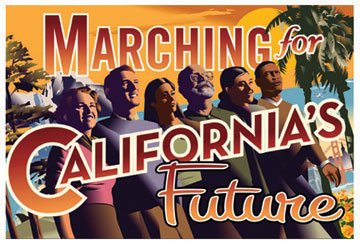Marty Hittelman is the president of the California Federation of Teachers.
 It is no longer enough to say that "Sacramento politics is dysfunctional," or that the political and legislative processes in the Capitol are stymied by "partisan gridlock." These first impressions have some basis in reality but don't adequately address California's real problems. These impressions only lead to a feeling of inevitability, cynicism, and despair.
It is no longer enough to say that "Sacramento politics is dysfunctional," or that the political and legislative processes in the Capitol are stymied by "partisan gridlock." These first impressions have some basis in reality but don't adequately address California's real problems. These impressions only lead to a feeling of inevitability, cynicism, and despair.What we need in public discussion is a clear picture of the problem and then a plan to fix it. And we all need a sign of hope that change will come. That's why, on March 5, we begin a "March for California's Future." The March will start with a group of public employees who will walk from Bakersfield to Sacramento. By April 21 the March will swell, as it reaches Sacramento, to many thousands. This 250 mile march, sponsored by the California Federation of Teachers and its diverse allies from labor, the faith community, and other civic supporters, is designed to draw attention to the underlying causes of the state's woes as well as gather signatures for a majority budget initiative.
The "March for California's Future" plans to kick start a "reality" discussion on how all Californians can join the fight for a livable California. The three themes of the march are "restore the promise of public education," "a government and economy that works for all," and "fair taxes to fund California's future."
One of the marchers is Irene Gonzalez. She grew up in foster homes throughout the Central Valley. Determined to make something of herself, she worked hard to put herself through school, eventually earning a masters degree. Today she is a probation officer, helping her clients stay out of trouble and on the right track to become productive members of society. In that process she keeps the rest of us safer too.

